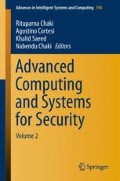Abstract
All the voting-based mutual exclusion (ME) algorithms that work on majority consensus inherently confirm safety criterion. However, such algorithms may violate progress condition when no single process gets majority of votes. In this paper, a new two-phase, hybrid ME algorithm is proposed that works even when majority consensus cannot be reached. Simulation results establish that the proposed algorithm offers lower message and time complexity as compared to established as well as recent algorithms. The second phase of the algorithm, in spite of being symmetric, executes in constant time.
Access this chapter
Tax calculation will be finalised at checkout
Purchases are for personal use only
References
Byeon, B.: NucVoter: a voting algorithm for reliable nucleosome prediction using next-generation sequencing data. ISRN Bioinform. (2013)
Ricart, G., Agrawala, A.K.: An optimal algorithm for mutual exclusion in computer networks. Commun. ACM 24(1), 9–17 (1981)
Ekbal, A., Saha, S.: Weighted vote based classifier ensemble selection using genetic algorithm for named entity recognition. NLCS 2010, 256–267 (2010)
Zarafshan, F., Latif-Shabgahi, G.R., Karimi, A.: A novel weighted voting algorithm based on neural networks for fault-tolerant systems. In: Proceedings of the 3rd IEEE International Conference on Computer Science and Information Technology (ICCSIT’10), pp. 135–139 (2010)
Thomas, T.H.: A majority consensus approach to concurrency control for multiple copy databases. ACM Trans. Database Syst. 4(2), 180–209 (1979)
Yu, G.X., Glass, E.M., Karonis, N.T., Maltsev, N.: “Knowledge-based voting algorithm for automated protein functional annotation. Proteins Struct Funct Bioinform 61(4), 907–917 (2005)
Saxena, P.C., Rai, J.: A survey of permission-based distributed mutual exclusion algorithms. Comput. Stand Interf 25(2), 159–181 (2003)
Hardekopf, B., Kwiat, K., Upadhyaya, S.: A decentralized voting algorithm for increasing dependability in distributed systems. In: Proceedings of the 7th International Conference on Information System Analysis and Synthesis (ISAS 2001) (2001)
Qin, M., Zimmermann, R.: An energy-efficient voting-based clustering algorithm for sensor networks. In: ACIS International Workshop on Self-Assembling Wireless Networks. SNPD/SAWN 2005, pp. 444–451 (2005)
Latif-Shabgahi G., Tokhi M.O., Taghvaei M.: Voting with dynamic threshold values for real-time fault-tolerant control systems. In: Proceedings of 16th International Federation of Automatic Control World Congress (IFAC‘05) (2005)
Hardekopf, B., Kwiat, K., Upadhyaya, S.: Secure and fault-tolerant voting in distributed systems. In: IEEE Aerospace Conference (2001)
Zarafshan, F., Karimi, A., Al-Haddad, S.A.R. Saripan, M.I., Subramaniam, S.: A preliminary study on ancestral voting algorithm for availability improvement of mutual exclusion in partitioned distributed systems. In: Proceedings of International Conference on Computers and Computing (ICCC’11), pp. 61–69 (2011)
Karimi, A., Zarafshan, F., Al-Haddad, S.A.R., Ramli, A.R.: A novel-input voting algorithm for -by-wire fault-tolerant systems. Sci. World J. 9 (2014). Article ID 672832
Latif-Shabgahi, G.R.: A novel algorithm for weighted average voting used in fault tolerant computing systems. Microprocess. Microsyst. 28(7), 357–361 (2004)
Ingols, K., Keidar, I.: Availability study of dynamic voting algorithms. In: Proceedings of the 21st IEEE International Conference on Distributed Computing Systems, pp. 247–254 (2001)
Gifford, D.K.: Weighted voting for replicated data. In: Proceedings of the Seventh ACM Symposium on Operating Systems Principles, pp. 150–162. ACM, Pacific Grove (1979)
Barbara, D., Garcia-Molina, H., Spauster, A.: Increasing avail-ability under mutual exclusion constraints with dynamic vote reassignment. ACM Trans. Comput. Syst. 7(4), 394–428 (1989)
Azadmanesh, A., Farahani, A., Najjar, L.: Fault tolerant weighted voting algorithms. Int. J. Netw. Security 2, 240–248 (2008)
Osrael, J., Froihofer, L., Chlaupek, N., Goeschka, K.M.: Availability and performance of the adaptive voting replication protocol. In: Proceedings of the 2nd International Conference on Availability, Reliability and Security (ARES’07), pp. 53–60 (2007)
Agrawal, D., Egecioglu, O., Abbadi, A.El: Billiard quorums on the grid. Inf. Process. Lett. 64, 9–16 (1997)
Author information
Authors and Affiliations
Corresponding author
Editor information
Editors and Affiliations
Rights and permissions
Copyright information
© 2016 Springer India
About this chapter
Cite this chapter
Kanrar, S., Chattopadhyay, S., Chaki, N. (2016). A New Hybrid Mutual Exclusion Algorithm in the Absence of Majority Consensus. In: Chaki, R., Cortesi, A., Saeed, K., Chaki, N. (eds) Advanced Computing and Systems for Security. Advances in Intelligent Systems and Computing, vol 396. Springer, New Delhi. https://doi.org/10.1007/978-81-322-2653-6_14
Download citation
DOI: https://doi.org/10.1007/978-81-322-2653-6_14
Published:
Publisher Name: Springer, New Delhi
Print ISBN: 978-81-322-2651-2
Online ISBN: 978-81-322-2653-6
eBook Packages: EngineeringEngineering (R0)

